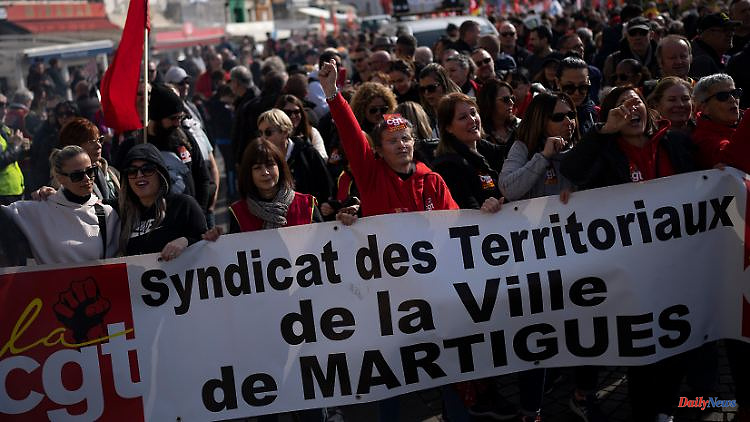President Macron's planned pension reform is once again driving tens of thousands of French people to protest. Many areas of public life come to a standstill due to the strikes. The leader of the left-wing populists, Mélenchon, is already calling for new elections.
Strikes and protests against the planned pension reform have once again paralyzed large parts of public life in France. "If so many people take to the streets and the government is so bad at justifying its plan, then it has to withdraw the reform," said CFDT union boss Laurent Berger at the beginning of a protest march in Paris. It is the largest protest movement in decades.
The unions had issued the slogan "to paralyze the whole country". In fact, on the sixth day of the protest, 80 percent of long-distance trains failed, and public transport in Paris and other major cities was severely affected. Demonstrators blocked all of the country's refineries, preventing petrol stations from being supplied with fuel.
Lessons were canceled in numerous schools, and around a third of the teaching staff stopped working. The Ministry of Education counted 48 partially blocked high schools. A poster with the inscription "No to compulsory service", which the government wants to introduce for young people, hung in front of a Paris high school blocked with garbage cans. Several universities were also blocked.
"Today is the beginning of a new phase, the strikes will continue in many places," said CGT union leader Philippe Martinez. More than 300 demonstrations are planned across the country. The unions wanted to discuss a possible extension of the strikes in the evening.
According to polls, two out of three French people are against the reform, which includes raising the retirement age from 62 to 65. After an initial debate in the National Assembly, the Senate, the second chamber of parliament, is currently debating the bill.
Left-wing populist party leader Jean-Luc Mélenchon called on President Emmanuel Macron to organize new elections or a referendum. "It is time he took a democratic initiative to respond to the blockade," Mélenchon said. He accused Macron of governing "inefficiently, unfairly and mercilessly".
At 39 percent, rail participation was lower than on the first day of the strike in January, when it had reached 46 percent. Slightly fewer teachers also stopped working than in January. The total number of demonstrators was eagerly awaited, for which the information provided by the government and the trade unions traditionally differed widely.
The French government wants the French to work longer to prevent a deficit in the pension fund. In addition, the minimum pension is to be raised to 1,200 euros for full contribution periods. The recruitment of seniors should be encouraged. According to the OECD, people in France leave the labor market at the age of 60 on average, and life expectancy is 80 years.












